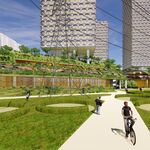Northern Light
Superstar
Like all things Liberal, some good ideas, some bad ones as well.
Are we going to see a pause on rental property development until the end of 2018 (when the Liberals find their fate)?
Foreign buyers tax, expanded rent control coming to Ontario
http://www.cbc.ca/news/canada/toron...ing-market-home-prices-rent-control-1.4076283
On rental: for the vast majority of landlords, no change here, vacancy de-control still applies, as do AGIs
On ownership: paper-flipping is one key area which they only committed to looking at w/no real commitment at this time; there is a need to tackle that
and in general pre-market purchases of large numbers of units by VIP Brokers.
On what they could do:
Existing Rental: Force the property tax rate down to the same as single-family residential over a period of time (say 10 years) and order that the savings be passed on renters.
New Rental: The main obstacle to new, affordable rental is not willingness to build, its that the bulk of the rental market have incomes insufficient to pay even entry-level rent in a new build.
Nothing built new will price a 1bdrm under $2,000 a month; or a 2bdrm under $2,400, plus hydro, plus parking.
The market for renters at this segment is not that strained.
Its the market for units at levels of rent at or below $1,500 that's strained.
And no new build can offer units at that price point barring outright subsidy.
The need here is primarily to address incomes. There are many ways to do that, from raising the minimum wage, to lowering income tax in a targeted way on lower and lower middle income households, to tightening the labour supply (thus forcing privately negotiated wages up) by curtailing overtime, or enriching parental leave, mandated greater paid vacations or some other means.
Its likely some combination of these that hit the sweet spot.
Another component has to be raising the rent in pubic housing (off-set by raising the shelter allowance under social assistance, and by a rising min. wage)
No private renter can compete w/rents set as low as $250 per month in some TCHC properties.
The notion here is not to raising those rents to market, but to something no so low as to make the point of competing for the low-income renter a non-starter.
***
On new rental construction, waving minimum parking requirements and amenities requirements would help lower costs somewhat.
When people look at those properties still renting units for under $1,300 a month.......they many notice no pool, or gym or party room etc.
Stripping these frill out could see rents on new building some down a bit.
In combination w/equalizing property tax......
I could see getting new build rents under $1,700 a month which is probably about as good at it'll get.




